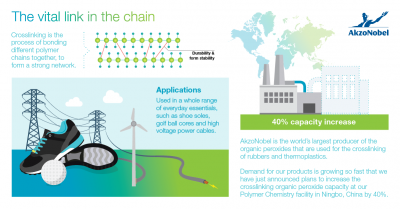AkzoNobel and Atul gear up for 2019 Indian production plans

Storming ahead
The two manufacturers first announced their joint venture on 9th December 2016, where the duo revealed its plans to build a MCA production facility at Atul’s existing facility in Gujarat, Western India.
Through its 50:50 share agreement, AkzoNobel and Atul are set to register the new plant as ‘Anaven’, with its build targeted for the first quarter of 2019.
“The Anaven partnership will contribute to our vision of driving profitable growth for AkzoNobel Specialty Chemicals in India, which is an important growth market,” stated Knut Schwalenberg, Managing Director of AkzoNobel’s Industrial Chemicals business.
“Our partnership with Atul is part of an asset-light strategy to expand our leading position in MCA through shared incremental investments,” Schwalenberg added.
Sunil Lalbhai, Chairman and Managing Director of Atul, also commented how the “Anaven project will be in sync with the ‘Make in India’ initiative of the Government of India”.
Used within the cosmetics, personal care and pharmaceutical companies to produce thickening agents, AkzoNobel describes MCA as “an essential building block in the chemical industry”.
Utilising resources
With a strong focus on sustainability, the Anaven partnership will use chlorine and hydrogen manufactured by Atul to produce MCA. Together, the partnership will utilise Atul’s established infrastructure and AkzoNobel’s eco-friendly hydrogenation technology to produce an initial start-up annual capacity of 32,000 tonnes per year.
As the Indian market is tipped for growth, the 2019-scheduled plant is anticipated to enable the future expansion up to 60,000 tonnes per year.
With existing plants in the Netherlands, China, Japan and the US, the final agreement is currently awaiting regulatory approvals and the signing of final agreements before its continues to its next stage of development.
“AkzoNobel is committed to organic growth and this cooperation will contribute to our vision of driving profitable growth in emerging markets, with a strong and established local partner in Atul,” Schwalenberg went on to say.
AkzoNobel has invested €1.83 billion in R&D in the last five years, with a fifth of its innovations attaining distinct sustainability benefits.
The company continues to “work with value chain partners and customers to focus on the development of eco-premium solutions – products that are clearly more sustainable than the most common alternatives on the market” to advance both innovation and sustainability.
Domestic demand
Market research company, Euromonitor International, highlights how India is expected to the fastest-growing major economy in 2017, moving from third place to above both Japan and Germany. The preference for natural products is driving this advancement, with the government and private operators supporting network growth.







![Latest developments from the South Korean beauty market. [Getty Images]](/var/wrbm_gb_food_pharma/storage/images/_aliases/wrbm_tiny/publications/cosmetics/cosmeticsdesign-asia.com/headlines/brand-innovation/korea-focus-able-c-c-kolmar-and-more-in-this-k-beauty-round-up/17357973-1-eng-GB/Korea-focus-Able-C-C-Kolmar-and-more-in-this-K-beauty-round-up.jpg)

![Able C&C has furthered its partnership with Japanese discount chain Daiso with new makeup launch. [A'pieu]](/var/wrbm_gb_food_pharma/storage/images/_aliases/wrbm_tiny/publications/cosmetics/cosmeticsdesign-asia.com/headlines/brand-innovation/a-pieu-and-daiso-launch-exclusive-2-makeup-line/17339117-1-eng-GB/A-pieu-and-Daiso-launch-exclusive-2-makeup-line.jpg)
![Down Under Enterprises is setting sights on the Asian market as environmental sustainability and traceability become increasingly important. [Getty Images]](/var/wrbm_gb_food_pharma/storage/images/_aliases/wrbm_tiny/publications/cosmetics/cosmeticsdesign-asia.com/headlines/market-trends/down-under-enterprises-shifts-focus-to-china-as-environmental-sustainability-traceability-come-into-the-spotlight/17304932-1-eng-GB/Down-Under-Enterprises-shifts-focus-to-China-as-environmental-sustainability-traceability-come-into-the-spotlight.jpg)
![News updates from Shiseido, Dr.Ci:Labo, Sephora, and more. [Shiseido]](/var/wrbm_gb_food_pharma/storage/images/_aliases/wrbm_tiny/publications/cosmetics/cosmeticsdesign-asia.com/headlines/brand-innovation/updates-from-shiseido-dr.ci-labo-sephora-and-more/17334944-1-eng-GB/Updates-from-Shiseido-Dr.Ci-Labo-Sephora-and-more.jpg)

![Clariant has underscored the importance of localisation strategies and distribution capabilities in China with beauty trends evolving at a rapid pace. [Getty Images]](/var/wrbm_gb_food_pharma/storage/images/_aliases/wrbm_tiny/publications/cosmetics/cosmeticsdesign-asia.com/article/2024/04/16/clariant-emphasises-importance-of-localisation-in-the-era-of-viral-trends/17327969-1-eng-GB/Clariant-emphasises-importance-of-localisation-in-the-era-of-viral-trends.jpg)



